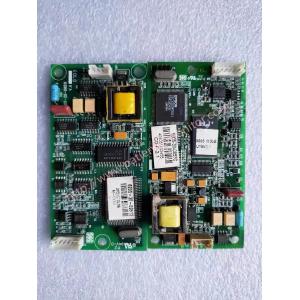
Add to Cart
P/N 9005-30-08530 Mindray PM7000 PM8000 PM9000 Patient Monitor Spo2 Board
The monitor measures the patient's SpO2 (oxygen saturation) and displays the following information:
1.Pulse value (PR) in the ECG parameter window.
2. Waveform of PLETH in waveform section.
3. The oxygen saturation value (SpO2%) in the SpO2 parameter window.
The PR value is only displayed in the ECG parameter window if:
1. SpO2 is selected in the HR DA setting in the ECG SETUP menu.
2. If AUTO is selected in the HR DA setting in the ECG SETUP menu, no ECG signal is received.
As shown in the figure below, the PLETH waveform is on the left and the SpO2 parameter window is on the right. The SpO2 value is given as a percentage, followed by the perfusion rate (proportional to the pulse intensity). You can also access the SpO2 Settings menu from the SpO2 tab in the upper left corner of the parameter window.
1. PLETH waveform 2. SPO2 label 3. SpO2 value 4. Perfusion indicator
SpO2 monitoring is a noninvasive technique for measuring the amount and pulse rate of oxyhemoglobin by measuring the absorbance of selected wavelengths of light.
The light produced by the researcher travels through the network and is converted into an electrical signal with a PHiliphhilipotodetector in the researcher's house. The SpO2 module processes the electrical signal and displays the digital SpO2 and waveform and pulse values on the screen.
The measuring wavelength of the sensor is nominally 660 nm for red LEDs and 940 nm for infrared LEDs. The maximum LED output power is 4 mW.
| Item name | Mindray PM7000 PM8000 PM9000 patient monitor spo2 board
|
| Brand | Mindray |
| Model | 9005-30-08530 |
| Use place | Hospital Devices; Medical Care; ICU; |
| Deliver time | 3-5 days |
| Warranty | 90 days |
Spo2 Monitoring Procedure
The choice of sensor for SpO2 measurement depends on the type of patient. Finger SpO2 sensor is selectable for adult patients. For newborns, you can choose a hand or foot sensor. See the steps below.
1. Turn on the screen.
2. Attach the sensor to the appropriate location on the patient.
3. Connect the sensor extension cable connector to the SpO2 connector on the monitor.
Spo2 Measurement Limitations
If the accuracy of any measurement seems unreasonable, first check the patient's vital signs by an alternative method. Then check if the instrument is working properly. Inaccurate measurements can be caused by:
Faulty SpO2 sensor;